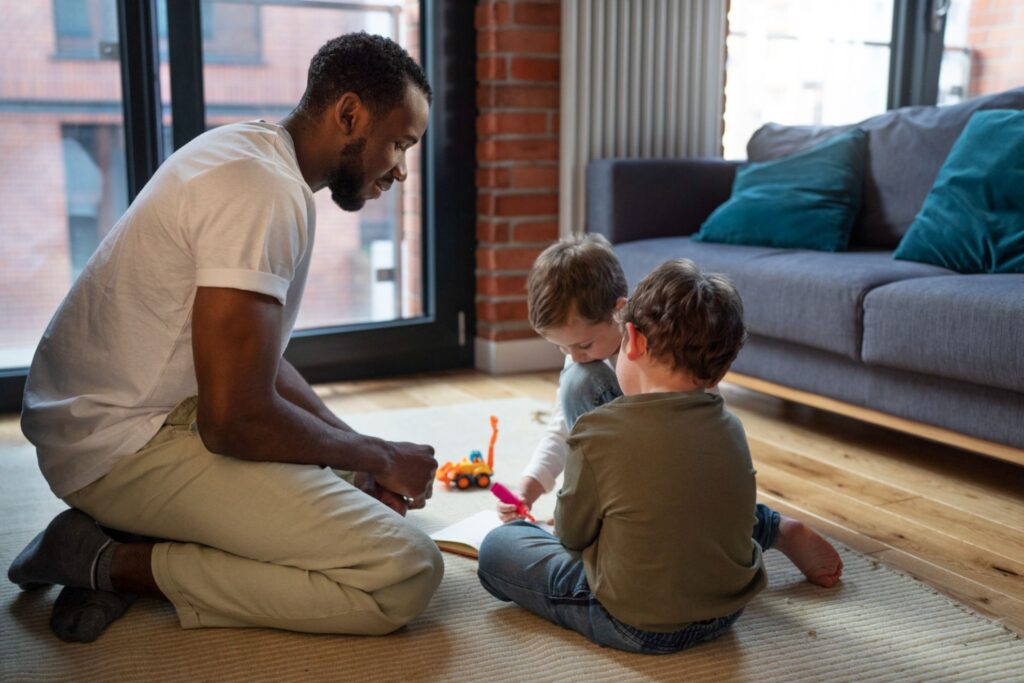
LET’S PLAY AGAIN
M Joosten
Head of Foundation Phase
Maria Montessori, a famous physician and educator once said, “Play is the work of a child.” She believed that play did not only develop children’s cognitive skills but helped to prepare them for all aspects of life.
Play has many benefits for a child. A child that has not been exposed to play lacks a number of important developmental stages. Play equips children with skills that they will need one day to study and later in the workplace. Such skills include:
- resilience
- confidence
- self-esteem
- interaction
- social skills
- independence
- curiosity
- coping with challenging situations
Unlike when our parents and grandparents grew up, children today are exposed to so much technology and screen time that play is almost ‘out of fashion’. One feels that today’s child must be pushed to use their own imagination to play. Maybe much of the fault lies in the world in which they are growing up – a world that has led too busy, rapidly changing lives for adults. After a long day at work or trying to juggle a bored child between jobs, the easiest thing is to give the child a screen – since this will keep them busy for hours.
Children do not need fancy toys or equipment to be able to play for hours without getting bored. A quick simple demonstration will get them going and they will be busy for hours in the backyard. What could be more exciting than role-playing a farmer growing his own vegetables, building shelters and surviving after escaping captivity or preparing a royal tea party? Not only will the child learn to play on his own but a new world will open for him.
Shouldn’t we be teaching our children to play again? As one parent said: “Throw the word boring out of your homes.”
Source: How play helps children’s development | nidirect

TEACHING GOOD CHARACTER
E Gouws
Head of Intermediate Phase
“There is no rewind button on parenting, so be intentional when it comes to building your child’s character.” Michele Borba
Show your children good values and moral behaviour. Adults must show children what good values look like in action. Parents should be the living example of how they expect their children to live. ‘Less talk, more action’ as the saying goes applies in this context. Children must see good values in their parents and not only read or hear about them.
Expect moral behaviour from your child. If you want your child to be kind demand that your child is kind to others. If you want your child to be honest, demandhonesty at all times. If you want your child to be hard working, give the child tasks that will demand hard work from your child. The standard expectation from your child should be good, virtuous behaviour. Do not accept anything lower. Be frank with your child, set standards and stick to them.
Without a doubt, people around your child affect him/her. Do not hand over your influence on your child’s moral development to TV shows, digital apps – Instagram, Snap Chat, Facebook etc. Children do not learn good character by facing a screen. Keeps tabs on your child’s media diet. Talk about moral issues as they arise so your child understands the moral beliefs of the family/the church.
Manners maketh a man even in the 21st century. Manners are the benchmark of respect, and these should be a priority in your home. Do not tolerate any back chat or rudeness. Stop the spread. Respect begets respect. Treat children respectfully so that they feel respected and are more likely to treat others respectfully.
Resilience helps children cope with difficult situations and move forward. Parents should role model this virtue when they face challenges and give their children strategies to weather storms because they have learned to do so. Parents should not simply help their children out of challenging circumstances but enable them to cope.
No person is better than another. Children should be exposed to games, toys and literature that represent multicultural groups so that the child will appreciate and accept differences. Expose your child to different perspectives (the biblical perspective) to help him/her empathise with others who are different to them. Do not allow discriminatory remarks in your presence.
Highlight service. No virtue is learner from a textbook but by putting it into practice. Urge your child to lend a hand which will help him/her understand the power of “doing good.”
Support your child. In a Jewish folktale a girl was trying to move a boulder from a path so she and her mother could pass. Her mother told her, “Use all of your strength”. The girl responded, “I am trying mom. I am pushing as hard as I can!” The mother continued, “Are you sure you are using all of your strength?” The girl pushed harder and harder, “Yes mom, I am, can’t you see!” The mother turned to her daughter with kindness and said, “No, you didn’t use all of your strength. You didn’t ask me for help.”
Praise goodness.
Sources: 36 ways to build kids’ character – The Robert D. and Billie Ray Center (drake.edu)
5 Positive Character Traits to Nurture in Your Child (childrencentral.net)

“It’s going away…it’s getting closer”
THE DOPPLER EFFECT
N Ngubane
Head of Senior Phase
Way back in 1842 Mr Doppler a mathematician from Australia proposed that where there is motion there are waves and those waves are in shifts in respect of where the observer is. As the object moves away from point A, the waves get stretched out and as it approaches point B, the waves get more compressed. It all depends on the direction from which you are observing the moving object.
Has it ever happened to you that you need to sigh while other people find more reasons to smile or the other way around? Take this example: when your children are getting to a certain stage and other parents all around are so thankful that their children have passed that stage. That is the doppler effect and remember the source of sound is in motion, it is not stationary. Likewise, your child is growing and is passing different stages.
When an ambulance siren sounds, it brings about different feelings to different people. For an injured person that needs help, it brings hope. For a person who has lost a dear one it may bring sorrow and lament once again. For a person who is in a hurry, it may cause a delay as he must give way to the ambulance.
Think for a moment, when your own child starts his day, what does he bring to different observers? Hope, sorrow or hindrance? This is then a solid or constant responsibility as the owner of a source of sound. The sound that is emitted must make those left behind hopeful and those who can hear it coming have hope too.
Some decisions in life are hard to make because of the consequences thereafter. However, they need to be made with wisdom and forbearing. One of these decisions is making subject choices at the end of the Senior Phase (Grade 9). Guiding your child helps but do it wisely since you have been observing your child and know his strengths and weaknesses. Guide him in a way that will emit the correct sound for you, his teachers, and his future.
Parenting, with its stages, is just like the doppler effect. Children go through stages, but they keep moving on. Let us help them move along with the correct sound that will bear hope.
Definition of doppler effect was sourced from: https://byjus.com/physics/doppler-effect/

DO AS I SAY NOT AS I DO
D van Straten
Head of FET Phase
Just like life, the English language can be difficult to understand at times. It sometimes contains paradoxes, euphemisms, parapraxes and ironies that can easily be misconstrued.
For example, Samuel Taylor Coleridge uses irony in his poem “The Rime of the Ancient Mariner” with the lines “Water, water, everywhere, Nor any drop to drink.”
According to the Merriam-Webster dictionary, irony is the use of words to express something other than and especially the opposite of the literal meaning.
As with writing, many life situations are also ironic. For example, it is common for the American Broadcasting Company to interrupt “A Charlie Brown Christmas” – a movie about the over-commercialisation of the holidays – to make room for more commercials. Additionally, the “Father of Traffic Safety,” William Eno, invented the stop sign, crosswalk, traffic circle, one-way street and taxi stand, yet he never learned how to drive.
Unlike the complexities of the English language and life, we as parents and teachers should strive to make situations and messages clear and understandable. Many parents and perhaps even teachers want their children and learners to do as they say, not as they do. We expect our children to be diligent, hard-working, punctual, tidy, thoughtful to siblings and friends, always patient and friendly and satisfied with what they receive—high expectations indeed.
But the question is, do we embody these traits ourselves? Let us strive to follow the example of the Apostle Paul in 1 Corinthians 11: “Follow my example…”
Sources: Anon. 2024. Irony – definition, types, uses and examples. [Web:] Irony – Definition, Types, Uses and Examples (byjus.com) Merriam-Webster Dictionary
Specktor, B. 2022. 30 funny examples of irony in real life. [Web:] Reader’s Digest Australia (www.readersdigest.com.au)

PREPARING OUR CHILDREN FOR THE WORKPLACE
G Geldenhuys
Academic Head
Education has been placed under increasing pressure during the past few decades to transform and adapt so as to meet the evolving needs of society. This will mean that the education your children receive will be quite different to the education you received.
One of the key trends shaping the educational landscape (besides, of course, the AI game-changer which is the hot topic right now) is the need to prioritise the so-called soft skills in schools and tertiary education if our children are to succeed in their profession.
In a 2019 Linkedin Talent Trends survey, 91% of employers ranked soft skills as their top requirement on the recruitment process. Research conducted by Harvard University, the Carnegie Foundation and Stanford Research and published by the National Soft Skills Association concluded that soft skills make an 85% contribution to career success.
We may be familiar with hard skills which are concrete and measurable. They are abilities, acquired through education and experience, which allow a person to perform a job-specific task. A doctor, for example, will need an advanced degree whereas an accountant will need to be familiar with Microsoft Excel.
So, what are these so-called soft skills that our children should have? According to Investopedia, soft skills can be thought of as people skills. These can include good communication and interpersonal skills, leadership, problem solving, a good work ethic, time management, and teamwork. These skills allow a person to be a positive, supportive, collaborative, influential, self-controlled, and empathetic worker, colleague or manager.
Hiring managers typically look for these attributes in job candidates, because no matter what your qualification may be, if you cannot be punctual, cannot work within a team or demonstrate dependability and attention to detail, your degree will not help you when handling difficult colleagues and disgruntled customers.
As I write this, I cannot help but notice that the soft skills the world so desperately seeks to prioritise in education literally jump off each page of the Bible. Jesus himself demonstrated these soft skills countless times in his relationship with his inner circle of 3, his close circle of 12, a larger circle of 72 and ultimately with each person He met during His life on earth. His golden rule, Love your neighbour as you love yourself Matthew 22:39 is a good place for us to start.
I sincerely believe DSS strives to inculcate these values whether on the sports field, the Life Orientation lesson, the prefects’ meeting, the excursion – in fact, moment-by-moment and day-by-day.
Together with you parents, let’s prepare our children for the workplace realising that these soft skills cannot be the frosting on the cake, but rather foundational principles for godly living.
Source: https://www.bizcommunity.com/Article/196/722/244982.html
